Indah Wulandari, 35, and her son, Nicolas Tegar, 12, pray July 15 at the grave of her husband at a government cemetery for COVID-19 victims in Bekasi, Indonesia. (CNS/Reuters/Willy Kurniawan)
The COVID-19 pandemic has reached a critical and even alarming point, say Catholic sisters and humanitarian leaders who are responding to the fast-spreading delta variant amid multiple problems.
"Just pick your continent, and we have some incredible challenges," said Sr. Carol Keehan of the Daughters of Charity, who heads a health task force for the Vatican COVID-19 Commission. "The pandemic is a mess."
"The situation is worse than ever in many different places," said Sean Callahan, president and chief executive officer of Baltimore-based Catholic Relief Services. "There's a combination of problems going on that we need to address."
One continent facing a severe problem is Asia, where countries like India and Indonesia are being devastated by the presence of numerous variants, including delta.
Advertisement
And as one example of how quickly the dynamics of the pandemic are changing, the Philippines, which sustained one of the longest and strictest lockdowns in 2020, has reimposed another two-week lockdown that ends Aug. 20.
During the lockdown, those younger than 18 and those 65 and older are not allowed to leave their homes. People with comorbidities, those with weak immune systems and pregnant women are also told to stay home. Mass gatherings are prohibited, including religious services.
In the face of such quickly changing circumstances, Callahan, Keehan and others spelled out some of the ongoing challenges worldwide: the swift spread of the delta variant and the threat of new variants; widespread hesitancy about the COVID-19 vaccines; and the continued inadequate vaccine supplies in many countries.
The pandemic also continues to pose challenges to countries already facing difficulties, including hunger, social unrest and other longstanding health problems like malaria and HIV/AIDS.
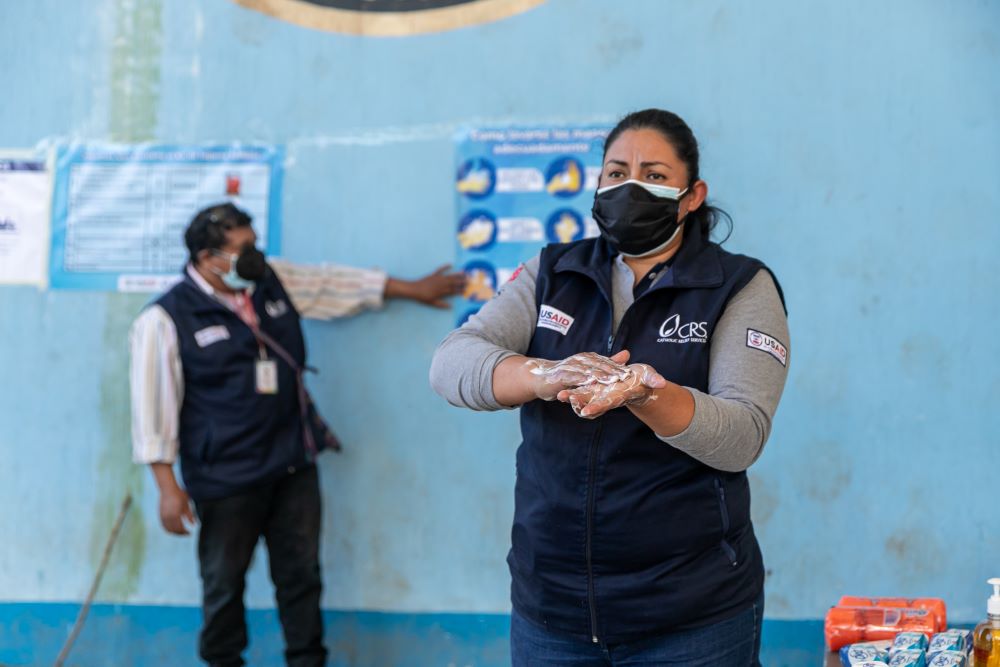
To help reduce the impact of COVID-19 in Guatemala, Catholic Relief Services personnel help people access hygiene and sanitation supplies. (Courtesy of Catholic Relief Services/Ivan Palma)
Callahan called the overall global response to the pandemic spotty and uneven.
"I don't think the international community moved soon enough or quick enough," Callahan said.
A hodgepodge of nation-by-nation responses, Keehan said, resulted in uneven situations.
"We saw this get away from us," she said.
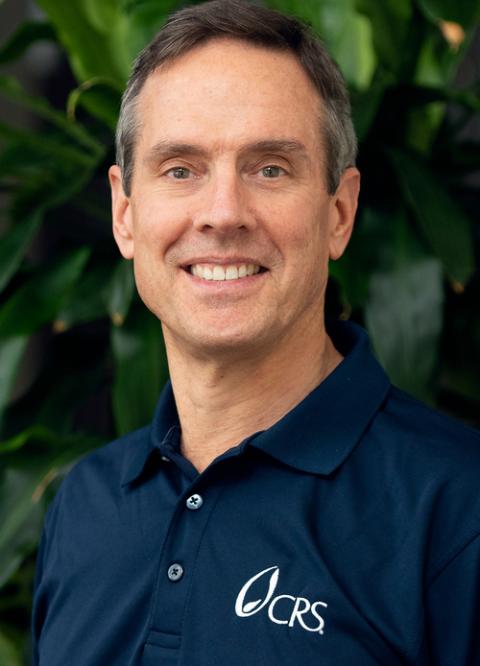
Sean Callahan, president and chief executive officer of Catholic Relief Services (Courtesy of Catholic Relief Services/Phil Laubner)
In the midst of so many challenges and new developments, Keehan said there is at least one bit of good news: COVID-19 vaccines will be available for distribution in most countries by the end of the year, an important milestone, she said.
Yet any optimism surrounding that goal will be tempered by the ongoing challenge of vaccine hesitancy. This is a problem in many U.S. states, where stockpiles of vaccine sit used, but it is also a dynamic in countries with a long history of corruption, suspicion of vaccination programs run by governments and pharmaceutical companies, and fear of fraudulent vaccines.
"The thing I worry about is that we'll have enough vaccine, but that people won't take it," Keehan said. "If people aren't vaccine-willing, we've got a real problem."
Keehan said one welcome development was the announcement earlier this month that the Association of Sisterhoods of Kenya is launching a six-month awareness campaign intended to work with the government to create a "Covid-19 free nation."
Sr. Carol Keehan, a Daughter of Charity and the former president and CEO of the Catholic Health Association (CNS/Courtesy of the Catholic Health Association)
That is part of the Vatican COVID-19 Commission's overall efforts to enlist sisters and local parishes in the work of grassroots vaccination education efforts, including providing access to a resource toolkit that includes information on vaccines and church teaching on vaccination.
Keehan, the former director of the Catholic Health Association of the United States, said such efforts are moving slowly, given the considerable health and social challenges in African countries and on other continents.
"It takes time and effort," she said. "You eat an elephant one bite at a time."
One country where that metaphor seems apt is Liberia in west Africa, where as of Aug. 12, only about 0.2% of the population had been fully vaccinated.
For now, Liberia is holding its own in terms of rates of infection, but that could quickly change with the spread of the delta variant, said Sr. Barbara Brillant, dean of the Mother Patern College of Health Sciences in the Liberian capital of Monrovia.
"I think if the delta variant gets a hold in Africa, it will be a disaster," she said in an interview with Global Sisters Report, noting that African countries have been generally behind the rest of the world in the spread of the virus as well as vaccination.
In the midst of such worries, the pandemic response of sisters globally continues — and what follows is only a sample. In the coming weeks, Global Sisters Report will examine the ways in which COVID-19 continues to affect sisters and those they minister to worldwide.
Children wait in line for free food from a relief program in a poor section of Manila, Philippines, on Jan. 21, during the COVID-19 pandemic. (CNS/Reuters/Eloisa Lopez)
The Philippines: Food pantries provide some relief in lockdown
The latest restrictions in the Philippines are difficult to implement in densely populated urban poor areas, said Sr. Mitzy Perez, a Mexican member of the Hermanas Misioneras Servidoras de la Palabra. She and Sr. Vicky Pham, a Vietnamese member of Perez's community, live in southern Caloocan City, part of metropolitan Manila.
"This is a very populated place, full of people," Perez said in a recent telephone interview with GSR. As many as five families live in one house, she said.
"My neighbors in front, [their house is the] same size as our house, but they have three families living there," she said, adding that the houses are so close that they can hear their neighbors on either side.
One sister oversees the implementation of the Kalookan Diocese's feeding program, which continues even with the return to lockdown. The sisters and their volunteers help provide one good meal for approximately 550 children once a week.
They also organize community pantries where a member of a family can get a bag of rice, vegetables, some canned goods and other items.
"The community pantry is for 100 families, and in order to cover all the areas, we need 13 community pantries so we can reach all the people," Perez said.
South Sudan: COVID-19 and vaccination take a back seat
South Sudan faces a number of challenges in getting people vaccinated, said Comboni Missionary Sr. Esperance Bamiriyo, a sister from the neighboring Democratic Republic of Congo who heads the Catholic Health Training Institute in Wau, which trains young South Sudanese health professionals.
These include delays in setting up COVID-19 testing facilities and vaccination sites, which means some communities do not yet have access to vaccines. There is also no well-coordinated response about vaccination, with "no prioritization for either 'front liners' [such as health workers] or elderly," Bamiriyo wrote in an email to GSR.
"Since vaccinations were open to all, in Wau where I reside, there was a high rate of response," but as a result, doses ran out. "Some people who travelled long distances missed [receiving the vaccine]."
(In May, South Sudan's National Task Force on COVID-19 returned 72,000 doses out of 132,000 it received in March because of concern the doses would expire before they would be used, the Voice of America reported.)
Other challenges: A vaccination rollout plan was not implemented, and there is a lack of enforcement of preventative measures, like mask mandates, she wrote. As of July 19, the most recent data available, only 0.5% of the population had received one dose of the vaccine, and not even 0.1% had been fully vaccinated.
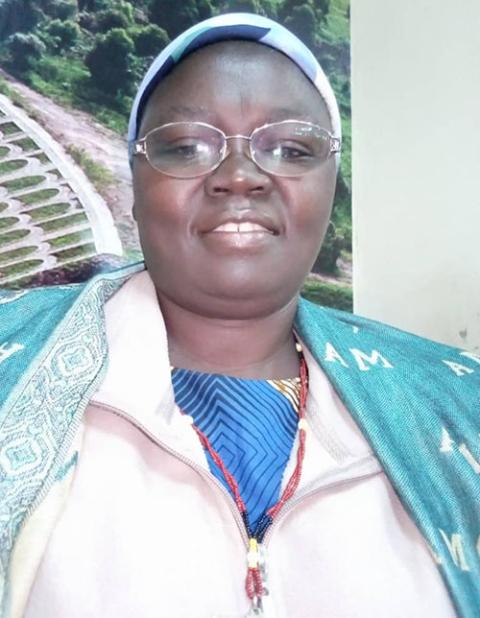
Comboni Missionary Sr. Esperance Bamiriyo, director of the Catholic Health Training Institute, which trains young South Sudanese health professionals. (Provided photo)
But perhaps a more basic challenge is that the country's attention remains on resolving an ongoing civil war, which is contributing to endemic hunger.
"People's basic needs are not satisfied. People are more worried for their daily living than for COVID-19," Bamiriyo wrote. As a result, "they go about their daily lives as usual with few people wearing face mask, no social distancing at all.
"Though people are dying of Covid, burials go on as usual and many more get infected in funerals and public gatherings."
She noted that her institute and other church-based institutions "continue to promote the word about prevention in communities," though they are not directly involved in getting people vaccinated.
"People's basic needs are not satisfied. People are more worried for their daily living than for COVID-19."
— Comboni Missionary Sr. Esperance Bamiriyo
Vietnam: Sisters make ends meet as delta sweeps through
Earlier this year, Vietnamese hoped some sense of normality might be returning to the country. The delta variant has dashed those hopes.
Dominican Sr. Mary Nguyen Thi My said the Dominican Sisters of Phu Cuong based in Bien Hoa near Ho Chi Minh City had 61 sisters infected with the delta variant as of Aug. 4. Those infected were quarantined and treated at a day care center.
The news from the southern coastal city of Nha Trang is perhaps not as grim, but it is still serious.
Sr. Mary Nguyen Thi Nguyet, superior of the Carmelites of the Sacred Heart based in the coastal city of Nha Trang in central Vietnam, said the congregation's two day care centers closed in early May because of an outbreak of the delta variant. That has caused hardship for the sisters, who live on the income generated from the centers, which serve approximately 140 children.
Nguyet said that earlier this summer, two sisters peeled shrimp from 6 a.m. to 2 p.m. daily at a local market, earning a total of 120,000 dong (about $5.25) per day until new movement restrictions July 28 meant they had to stop. They developed ongoing pain in their fingers because they were new to peeling shrimp, she said. Other sisters make yogurt and corn milk to sell.
While those efforts continue, the sisters have faced stricter movement restrictions since early July.
"We are given [ration] tickets to go out to buy drinking water, vegetables and other basic food at some shops every four days, as our area has been isolated since July 28 after some infections were detected," Nguyet said.
"We attend online Masses and spend a lot of time contemplating, saying prayers, reciting the rosary... and strongly appealing to God to end the pandemic soon," she said. They also read, improve their computer skills, sew clothes, garden and clean the day care centers.
"We will face a lack of food if the movement restrictions are extended to one month more," Nguyet said. "We absolutely trust in divine providence."
Between April 27 and Aug. 12, the Southeast Asian country recorded 242,552 cases of COVID-19. As of Aug. 11, only 1.1 % of the population had been fully vaccinated.
Getting a handle globally means handling locally
Amid the mounting cases worldwide, those responding are observing that the pandemic must be addressed at all levels: globally, locally and even personally.
"The lesson learned is that we're a small world," Brillant said. "We now understand how behavior in one country can affect another country."
Personal experiences have become part of the pandemic narrative. Callahan, for example, said his in-laws from India both died of COVID-19 earlier this year.
"For us, it has hit very close to home," he said.
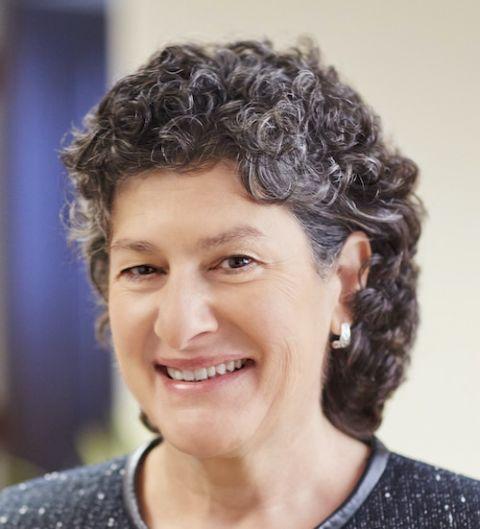
Mercy Sr. Mary Haddad, president of the Catholic Health Association (Courtesy of CHA)
Brillant, who is on a break in Maine right now, said a neighbor is reluctant to get vaccinated, and she is trying to convince him to do so. Mercy Sr. Mary Haddad, president of the Catholic Health Association, faces a similar situation within her family.
Haddad said everyone must redouble efforts to get friends and family vaccinated.
"If we want to get a handle on this globally, we have to handle this locally," said Haddad, who recently implored all health care workers in the United States to get vaccinated.
"It's on us, this resistance to getting vaccinated," she said, focusing in particular on the resistance in the United States. "It's very disturbing to me as we look at the need to protect the common good. This could be managed."
Haddad paused and drew in a breath. "I didn't think we'd ever be where we are today."
[Charity Durano in the Philippines and Joachim Pham in Vietnam contributed to this report.]
"The lesson learned is that we're a small world. We now understand how behavior in one country can affect another country."
— Sr. Barbara Brillant
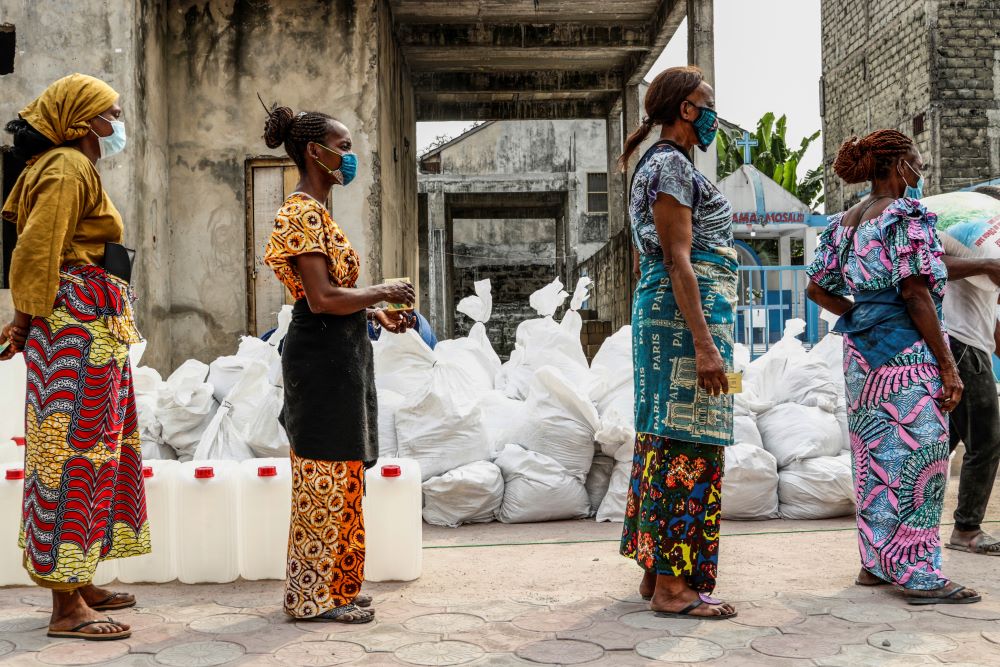
The secondary impacts of the COVID-19 pandemic have hit many countries hard, including worsening hunger in places like the Democratic Republic of Congo, where Catholic Relief Services provides food and cash assistance to hard-hit families. (Courtesy of Catholic Relief Services/Justin Makangara)






